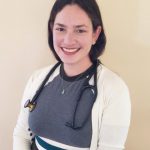By Juliette Carr, Grace Cottage Family Health & Hospital
I am a Family Nurse Practitioner providing primary care in the clinic at Grace Cottage Family Health in Townshend, VT. For this week’s Graceful Health column, Grace Cottage Family Health and Hospital has asked me to introduce the practice of integrative medicine to you, as this is a central part of my practice.
Integrative medicine is the practice of using modern medicine together with complementary holistic practices to combine the scientific advances of the last century with thousands of years of healing tradition, viewed through the lens of evidence-based medicine.
Complementary practices focus on maintaining or restoring balance in the body, as opposed to treating diseases like modern medicine. These practices include nutrition, supplements, massage, acupuncture, mind-body medicine, and others.
By definition, holistic medicine takes into account the whole person: we focus on the ways that a person’s life influences their health and their health influences their life. Choosing the right therapy is based entirely on patient preference, cultural context, value system, and personal wellness goals.
In my practice, this means a deep commitment to healthcare encounters that feel comfortable, free from bias, and encourage weight and body neutrality, as well as creating a space that feels safe and accessible for all kinds of people.
As a Registered Herbalist with the American Herbalists Guild (the highest level of credentialing in the field), my areas of expertise are clinical herbal medicine (using evidence-based plant remedies) and food-as-medicine nutrition, which is about choosing foods that nourish our specific health goals.
I earned my Family Nurse Practitioner degree from Georgetown University, where I was trained in primary care from the perspective of modern medicine. As a Nurse Practitioner working in integrative medicine, this means combining traditional plant-based remedies and nutrition with modern drugs and treatments as appropriate.
However, other therapies might be a better fit, so I often refer to other complementary medicine providers, such as massage or craniosacral, as well as to services that meet other holistic needs (community resources, food access programs, etc.).
Choosing the right approach is all about working as a team towards people’s goals. Some people seen for integrative medicine manage their wellness only through food and lifestyle, while others add complementary practices such as herbal remedies or acupuncture.
Many people work towards their goals exclusively with the help of pharmaceutical medications, without the use of integrative practices. This can still be a holistic model, as long as their personal goals are at the center of the decision-making process, and the conversation is informed by the truths of their life: not just their lab work and vital signs, but also their culture, community support, happiness and stressors, sleep quality, access to resources, and other outside influences on health.
Another aspect of practicing integrative medicine is being able to give meaningful advice on the safety and usefulness of supplements that people are considering taking on their own. Many people who primarily take pharmaceuticals also use over-the-counter supplements independently. Often people forget to mention the supplements to their providers, or medical providers have not been trained on how the supplements work, whether or not they might be useful, and how they might interact with medications. Herb-drug interactions can be very serious, and there are significant quality control issues within the natural products industry, as it is unregulated. Sometimes integrative medicine is knowing enough to be able to advise against supplements, if they are not a good fit for a given situation.
At its heart, integrative medicine is a practice of listening, flexibility, and willingness to make a plan that can be put into practice as part of a daily routine to help restore balance based on a person’s individual goals. This is your healthcare: it should fit your life.

